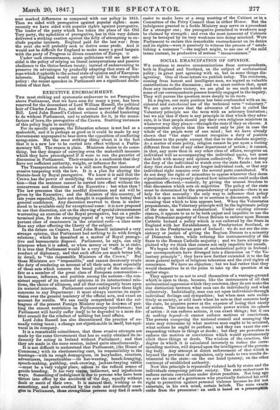EXECUTIVE ENCROACHMENT.
THE most striking and systematic endeavour to set Prerogative above Parliament, that we have seen for many a year, has been reserved for the descendant of Lord William Russell, the political heir of Charles James Fox, and the actual mover of the Reform Bill. Lord John Russell's Cabinet evinces a decided hankering to do without Parliament, and to substitute for it, in the manu- facture of laws, the prerogative of the Crown. Startling instances of this policy begin to multiply.
For its specific purpose, the Education scheme is not bad as a
makeshift, and it is perhaps as good as it could be made by any Government unprepared to bear down the opposition of conflicting antagonists. But the most striking thing about it is the fact that it is a new law to be carried into effect without a Parlia- mentary bill. The reason is plain. Ministers desire to do some- thing, but they despair of carrying even the makeshift measure which they have promulgated if it were to run the gauntlet of discussion in Parliament. Their evasion is a confession that they have not sufficient authority, weight, or influence for that.
The Transportation scheme is a still more flagrant instance of evasive tampering with the law. It is a plan for altering the Statute-book by Royal prerogative. We know it is said that the Crown has the power of modifying the sentence of transporta- tion—that the sentence cannot be carried into effect without the concurrence and directions of the Executive : but what then ? The law presumes that the needful directions and aid will be given by the Executive; and the Ministers of this country, of late years especially, have not thought it expedient to betray that general confidence. Any discretion reserved to them is under- stood to be available only for exceptional cases : it is now proposed to use that discretion, not on the showing of special circumstances warranting an exercise of the Royal prerogative, but on a prede- termined plan, for the sweeping repeal of a very large and im- portant class of enactments in the criminal code—a class more than any other affecting the liberty of the subject. In the debate on Cracow, Lord John Russell intimated a very
strange opinion, that Parliament had nothing to do with foreign relations; which he described as a matter of Royal preroga- tive and bureaucratic disposal. Parliament, he says, can only interpose when it is asked, or when money or trade is at stake. It is true that Parliament would be a very bad " office " for the conduct of diplomacy, and that such affairs are much better left, in detail, to "the responsible Ministers of the Crown." But those Ministers are "responsible," and cannot decorously evade the duty of rendering an account of all their acts, most especially of those acts which concern the broad policy of the nation—its fate as a member of the great class of European communities— its honour, influence, and position among the nations—the con- sistent support of its national opinions in its international rela- tions, the choice of alliances, and all that contingently bears upon its material interests. Parliament cannot safely leave these high concerns to any Department : it must always exercise its super- vision over the general tendency of the official acts, and exact an account for results. We can easily comprehend that the col- leagues of the present Foreign Minister may be desirous of put- ting the utmost restriction on Parliamentary interference; but Parliament will hardly suffer itself to be degraded to a mere dis- trict council for the conduct of nothing but local affairs. Lord John Russell has also discontinued the practice of an- nually voting taxes ; a change not objectionable in itself, but equi- vocal in its company.
It is a remarkable coincidence, that these evasive attempts are made by the same Government that has so easily obtained its in- demnity for acting in Ireland without Parliament ; and that they are made in the same session, indeed quite simultaneously. It is not difficult to understand that Parliament, (the House of
Commons,) with its electioneering cant, its responsibility to the hustings—with its rough demagogues, its busybodies, roturiers, adventurers, impracticables-- its hat-wearing, bench-lounging, speech-making, gabbling, cock-crowing, jackass-braying rabble —must be a very vulgar place, odious to the refined senses of gentle breeding. It has very coarse, indiscreet, and injudicious ways. Something of indulgence is due to persons who have been thrust into office by the accidents of the day, equally without fault or merit of their own. It is natural that, wishing to do something, and quite overlaid by the rude and disorderly ener- gies in Parliament, those strengthless persons may find it much easier to make laws at a snug meeting of the Cabinet or in a Committee of the Privy Council than in either House. But the indulgence granted to a feeble Ministry may serve as a precedent for a stronger one; the prerogative permitted to weakness may be claimed by strength ; and even the most innocent of Cabinets may be betrayed by its very weakness into doing mischief. Were Parliament to endure this remarkable encroachment on its duties and its rights—were it passively to witness the process of " estab- lishing a nuisance "—the neglect might, to use one of the mild terms current, be productive of serious "inconvenience."


























 Previous page
Previous page